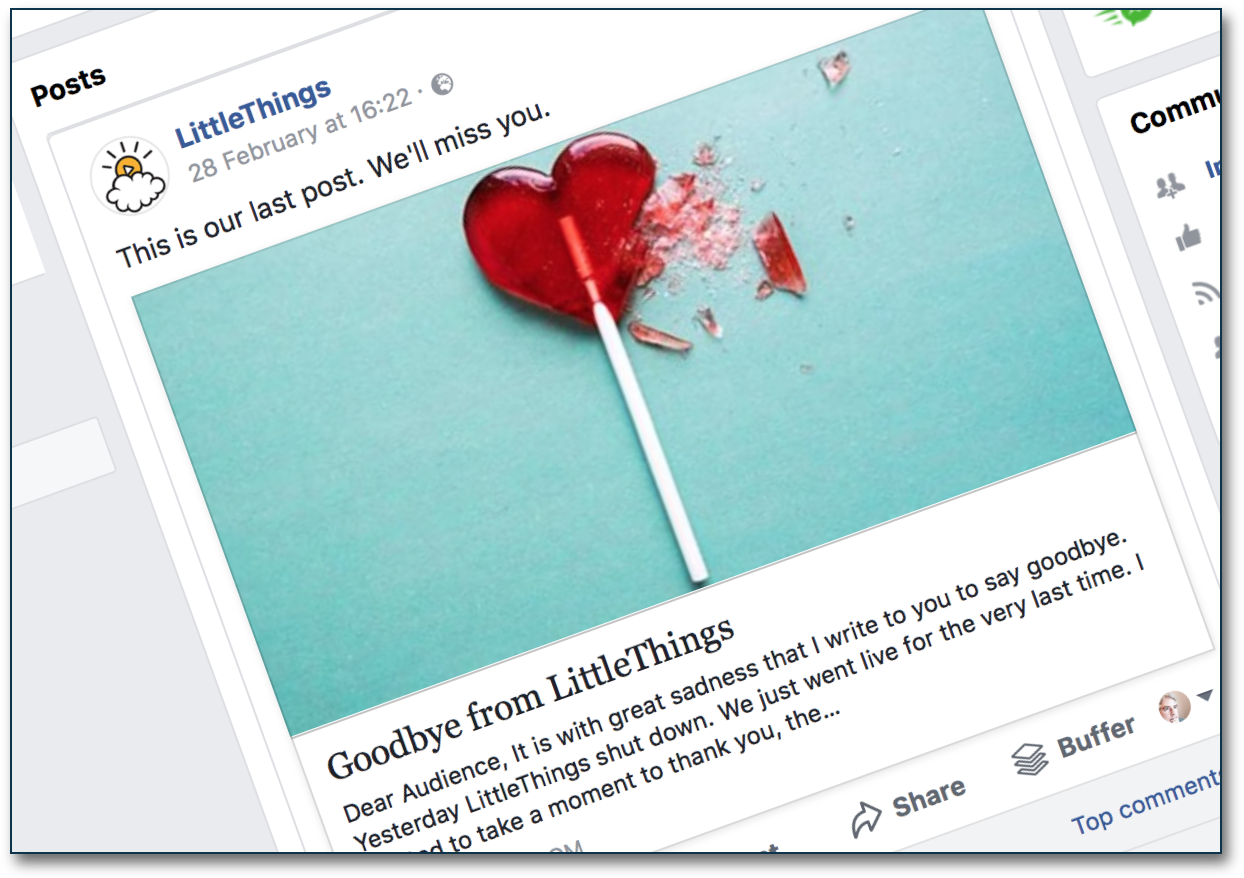The LittleThings lesson publishers should be learning

The first major casualty of the Facebook algorithm change was announced last week: LittleThings was closing up, putting 100 people out of work. And, inevitably, they were a Facebook traffic-dependent publisher. Lucia Moses has written a great profile of LittleThings for Digiday:
CEO and founder Joe Speiser brushed aside comparisons to fast-growth Facebook publishers like Upworthy and ViralNova. This time it was different, since LittleThings was an original content publisher — and Facebook needed publishers like LittleThings that drove engagement on the platform. As Facebook changed — emphasizing video, in particular — so too would LittleThings. “As long as you constantly pivot within the Facebook ecosystem, you’ll be fine,” Speiser said on the Digiday Podcast in May 2016.
That’s a lovely theory – right up until the moment that the algorithm pivots away from publisher content completely. Seven years ago I watched a business be all but destroyed by the Panda algorithm update to Google search – because that business was entirely dependent on Google traffic. And now history is repeating itself with Facebook.
The Facebook Partnership Delusion
The now-deceased site had a fascinating history:
LittleThings, which started as a pet supplies e-commerce site, became a poster child for astonishing audience growth, topping 50 million uniques in three years by sharing inspirational stories on Facebook about people and animals doing heroic things, among other inspirational content aimed squarely at Facebook’s sweet spot: middle-aged women. The formula thrived for a while as long as Facebook rewarded it and other clicky content sites with referral traffic. Facebook even touted the company in its case studies.
The emphasis in the last sentence is mine. It matches well with this, from later in the Digiday piece:
“I think people were a little wary of being so tied to Facebook and its whims and about the potential of that being the main source of our traffic and revenue,” said Meghan Holmgren, the former managing editor. “But everything I heard from Joe or Gretchen was, we have a great relationship with them.”
There’s a touch of both arrogance and stupidity in believing that you, as a publisher, have a “great relationship with Facebook”. However friendly and approachable the news partnerships team might be, they’re very low down the power base of the company. The idea that they have a deep influence on how the algorithm treats publishers is nonsense.
You’d be better off treating them, mentally at least, as what they are, in effect: PRs. But that illusionary relationship was enough to stop LittleThings doing what it should have done: investigating in building direct relationships with readers acquired via Facebook.
Speiser had bought the Facebook PR, hook, line and sinker:
“I think we need each other. We need them for the traffic; they need us for the content,” Mr. Speiser said on this week’s WSJ Media Mix podcast. “I think [Facebook] cares very much. I think without the content all these media companies are providing there’d be that much less reason to go on to the news feed.”
Turns out that cute animal content is easily replaceable by, say, pictures of your cousin’s cute baby.
Death by journalistic drivel
Jeff Jarvis is most certainly not going to mourn LittleThings‘ passing:
I’m not going to cry many tears about losing the drivel because drivel it was. (“I Put A Wacky Doggy Leotard On My Dog To See If It Would Help With Her Anxiety And Dander.”)
However, it’s the root of a much deeper point:
But Facebook — and, for that matter, media as a whole — are being turned into perpetual fluff machines alongside massive polarization factories because that’s what the business model of volume for volume’s sake — eyeballs by the ton! — leads to, especially in an abundance-based market where prices fall toward zero.
In essence, there are two really big problems with structuring a publication around a single traffic acquisition source, and this applies as much to Google as to Facebook:
- You live completely at the whim of that traffic source. They can kill your business overnight
- You lose control over the direction of your journalism, as that’s entirely dictated to you by what works in the algorithm, which is, in turn, dictated by the company.
Any journalism business that doesn’t try to diversify its reader engagement strategy – and its monetisation models – is dooming itself to this kind of sudden death.
As John Gruber of Daring Fireball put it:
Facebook is the biggest threat there has ever been to the open web. Any publisher that is dependent on Facebook, or that trusts Facebook, is out of their goddamn mind.





